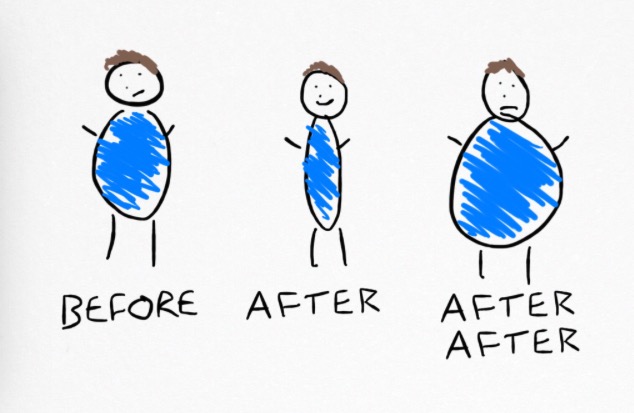3 Top Reasons For Regain After Weight Loss Surgery

So why is it that so many will fall short of losing the optimal amount of weight for their health and will actually regain within 3 years much if not all of the weight they lost? Some studies say 1/3 of patients will regain most of their weight post-surgery. I think the number is actually higher because many people who regain simply fall out of contact with their bariatric surgeon and support staff because they feel ashamed, so the statistics do not include these people. So, why do most people regain the weight? What can you do to help insure that you will be one of the successful long-term losers of your excess weight? By examining why people fail you can create a plan for how you will succeed.
The government agency, National Institutes for Health (NIH) defines weight-loss surgery as "merely a tool that helps people get a new start toward maintaining long-term good health. The surgery alone will not help someone lose weight and keep it off. Together with a reduced-calorie and low-fat diet and daily exercise, surgery will help an individual lose weight and maintain the weight loss.” Please read that a few times. That is how important this quote is! The surgery alone will not help someone lose weight and keep it off.
We as weight-loss surgery patients have a history of seeking comfort, happiness and pleasure through food. We wouldn't be here if that weren't true. Me included. The process of surgically altering our anatomies does nothing to remove from us the tendency to seek comfort in familiar ways but assures there will be physical suffering if we do. Post-surgery we will still have the same brain that is used to comforting us with food, and we will still have the fingers and the arms that are used to lifting food to the same mouth to find comfort and pleasure. It is critically important that the WLS patient seek out new ways to soothe, comfort, and find pleasure in their world other than by eating.
ONE main reason patients regain their weight is they search for ways to get around the surgery, still thinking of food as primarily a source of pleasure, not a source of fuel that can be pleasurable. This is often done relying on liquid calories, which may pass more easily, like high calorie coffee or juice bar drinks or alcohol. This is also done post-operatively by trying to maintain the presence of “trigger foods” in their lives. “Trigger foods” are often foods from the patient's past that helped cause obesity, do not satisfy hunger but instead create a craving. Many are high-calorie and highly processed, not nutritious. Trigger foods can include chocolate, chips, crackers, bread, cookies, ice cream, pudding, lattes, frapuccinos and alcoholic beverages. Really, any food can be a “trigger food” if there is so much pleasure in the “mouth-feel” or taste that repeating the pleasurable experience takes on more importance than actually feeding hunger. Very successful patients cultivate a mostly trigger-free post- surgical life. Bariatric surgeons and the NIH know the most common reason for regain and the most common post- surgical complication is “noncompliance.” Non-compliance is a fancy word that means the patient is not eating and exercising the way he/she agreed to before surgery. These people “talk the talk.” The successful patient “walks the walk” after surgery and changes how they eat and move.
A SECOND reason people often regain beginning in the second or third year post-op is that the “honeymoon” is over. The “honeymoon” generally encompasses the first 12 to 18 months post- surgery. During this time many patients will say, "I could eat all the chocolate and ice cream I wanted and still lose weight. I didn't have to try and the weight just came off.” This is often true because the body has been through such a shock after surgery that it takes months for the body to reset itself and learn to function with its' new physiology. Patients who regain their weight often believe that this “honeymoon period” is the new way that it will always be and don't adopt healthy eating patterns. So when their “honeymoon period” ends as it will they believe that the surgery has somehow failed them. In reality they have failed their surgery! During the first 12-18 months post-op it is essential to develop healthy patterns around food and exercise. This is the time when it is actually easiest to do and to not do so wastes a once-in-a-lifetime opportunity to begin a great new life with positive momentum.
A THIRD reason many patients regain much of their lost weight is a lack of support. Humans are social animals and we desire and need the support of each other throughout our lives. For thousands, if not tens of thousands, of years people coming together as a family or a community over food has been a way we connect with each other. Post-surgery, when the patient isn't able to eat what others are eating or in the quantities others are eating, or others are eating their 'trigger foods”, life can feel very stressful and lonely. This can be compounded by being around unsupportive people or people who want to be supportive but don't know how. Patients fail by not surrounding themselves with supportive people in a safe environment where they also must be accountable for their actions and behavior with food and their bodies. It is key to have a community of professionals and non-professionals who understand the challenges and hardships faced by those carving a new life with a new anatomical structure. There are online and in-person support groups. Even patients who've gone abroad for weight loss surgery can often use the support services available with their local medical group's Bariatric department. Creating relationships that support and assist you in becoming a healthier person and that hold you accountable for making healthy choices are key.
These are my top three. What would you add to this list? What plan will you create to deal with the items you add to this list? Who will support you on this journey of your life.....for your life?
Sara Kelly Keenan and others,
I am trying to come up with a "top ten" list of things to do when I am stressed and need "comfort" instead of eat. Any suggestions, in addition to exercise I mean?
Any suggestions would be most helpful. Especially any for stress at work and/or stress at work when someone brings in your favorite chocolate cake, etc.
I am still pre-op but want to be successful in the long run.
Hi FocusOnMeNow,
One of the things i do in my practice is help people create and live a list like the one you refer to. What I've learned over time is that it is a very personal list and needs to be revisited over and over again. It also helps to break the list down into small, achievable tasks. Everyone finds comfort in different ways or combinations of ways and those ways change over time. The list can also broaden as you lose weight and work on fitness as well. For instance, my first list included walking my dogs 20 minutes per day up a 300 foot hill. That, over several years, morphed into a passion for hiking, then ultra-distance hiking, then mountain-climbing. I could not have known at 333 pounds what my list would become! My best advice to you is create a flexible list that you revisit often to add activities that provide comfort, but more importantly passion. When we live passionate, vision-filled lives things like the cake are less tempting because they don't advance us on our paths towards our vision of the future-life we desire.
Edited by Sara Kelly Keenan LC
Im going to go with preparation. To often I am seeing so many people not getting the pre surgical preparation work done. They do not know what they are in for. It seems that either there are many unscrupulous practices out there, or its just that people are not reading up on the surgery and what to expect. So many of these surgeons do so many surgeries they don't have the time to educate the potential patients as to what is really involved.
We see lots of people taking advice from non-qualified people. Or they ask very simple questions about topics that should be part of the basic prep work done by a surgeons practice prior to and immediately following surgery. As a result people are not mentally prepared to make this journey count and to use this tool to make those lifestyle changes so that when the "honeymoon" period is over they can still go forth with their new knowledge and their new attitude and lifestyle, and make the most of it.
Now i wholeheartedly agree also with the support reason. I find more and more people here and in other forums etc, that hide their WLS from everyone, because they either fear failure, or they fear some type of stigma. WHen you hide the WLS, you cannot expect support when people don't even know you need support. I am a big proponent of the open and often, method. I have a blog, and I share my WLS story with everyone and anyone. I am proud to be on this journey and proud enough to make myself succeed. The daily or the like, affirmations i get from friends , family and coworkers are truly a way to recharge, when i'm feeling down or feeling that this is too tough. I think people focus on part of the journey , like exercise, and they dont try to educate themselves in things like nutrition and how to cook in smaller portions or t with healthier ingredients. I also see people who think that they just have to summer for a few months then when they hit their goal, and go into maintenance mode, they can just go back to eating whatever they want. Attitude is so important here. Honestly, If i didn't have a breakthrough in my meeting with a counselor, I might not have made it this far either.
Once I did have the counseling, they made sure I understood , why I had failed before, and why i got fat. Yes i use the term fat, I wont hide from who I was, or what I was. I feel it is important not to live in a delusion about where we are/were and where we want to be.
Since I haven't seen much rigorous research around the regain after weight loss issue (other than at the National Weight Loss Registry), I don't know if the opinion piece above is correct or not. I think those three behaviors cited would be obvious contributors to regain, but it's not exactly an insight to suggest that "noncompliance" is the reason for WLS failure.
There are other things happening post-op and post-goal with some patients. I know several very disciplined, intelligent people who dutifully track every bite and swallow who, after reaching goal, are eating 1200 calories or less (!) daily and at least 60 grams of Protein -- but they're still slowly regaining weight. They report needing to eat 800 or fewer calories to lose weight -- and then it's very slow progress.
Weight loss, weight maintenance, regain, and associated issues continue to be areas that should attract rigorous, reliable research. I sincerely wish there more of it.
VSGAnn,
I agree with you that there isn't enough (I'd say any) rigorous research around the regain issue and I wish there was more of it too. NWLR's study is good for learning what "works" but not great since becoming a member of their study requires successful, maintained weight loss. It's a study of what "works" in weight loss generally and is not a study of Weight Loss Surgery. Unlike other "disease recovery studies" there is shame and stigma involved in regain of weight so the patient is more likely to disconnect from medical resources and "fall of the radar."
Regarding those people you mentioned who are regaining on 1200 calories per day, I work with people like that to speed-up their metabolisms very gradually so they can eat up to 2300-2800 calories per day and burn it all. But it tests most people's self-discipline to be able to do that. It involves very intentional daily exercise and very precise nutritional macros which are both ramped up slowly over a period of months. It takes a tremendous amount of focus and dedication for 4-6 months, like the focus required for professional athletics, but it is possible. Using this approach I took my metabolism from burning 1200 calories per day (after weight-loss) to maintaining my current weight eating 2800 calories per day. My calorie consumption is higher than the average because I am over six feet tall.
I doubt very highly that there is any one reason that any one person regains. It is probably a combination of not paying attention to what and how much a person is eating. I am only six months out and still very restricted in the amount I can eat. I would not call this a honeymoon in any way. It has been damn difficult since surgery. Eating mostly hurts to some degree and I rarely enjoy food. At this point, I don't really miss it. I accept that this is the new normal.
MBM1Forever,
You are right about it not always feeling like a Honeymoom. It's only a Honeymoon in that many people find losing weight in the first year is easier than losing it after the first year or maintaining the loss. But the first 6-12 months for me were closer to a Hell than a Honeymoon. I do want to offer you some hope and tell you that for me the first year was the worst and it was not a "new normal" I was living but was a hard-time of adjustment. The new normal that I settled into in the years after was more pleasant and easier to live with. 13 years later I can tell you that in the first year I couldn't have imagined what is normal for me now! I think it is likely that your "damn difficult" time is part of the early phase of recovery and it will get better. "New Normal" is likely a kinder place and further down the road.
As a family nurse practitioner in bariatric surgery care and podcaster of the Weight Loss Surgery Podcast I think you bring up some very important points. However, where I take exception is with the delicate matter of blame, aka “noncompliance” woven throughout your piece.
Thank you for your comments Reeger,
They are detailed, informative and add a lot to this discussion. You are right that the physiology of obesity is a complicated and still mysterious area of medicine, that we are in the early stages of understanding the science of obesity medicine and the shortcomings of the procedures. You are much better trained and informed than I to have that discussion with our clients. The word "non compliance" comes from the National Institutes for Health (NIH) research materials I quoted. I did not intend any blame in the use of that word. For me, it is a statement of fact and I took it as such from the NIH. For example, in my first 3 years post-op (2004-2007) when I lived on caffeine and high-calorie liquids (as I wrote about in my article "Vulnerability, Weight Loss Surgery and Cross-Addictions" last August) I was in "non-compliance" with my doctor's care plan for me and my pre-surgery plan and promise to myself. I am acknowledging the fact.
You, as a medical professional, and I, as a coach, have a common goal I believe which is to help our clients become the healthier people they desire to be. I believe our roles are different but complimentary. You have outlined very well the shortcomings of the procedures and how medical science is in many ways in its' infancy in understanding the biological issues that come into play with obesity. That is your area of expertise and I leave that to you and the bariatric surgeons who refer people to me to discuss that with our clients.
I, as a coach, have a different role. My role is to help our clients figure out "where" they are with regard to their health, "where" they want to be, what incremental steps they can take and are willing to take to move that direction and then support them in moving that direction with a intentional plan.
I wrote this article to highlight how people struggle and what steps they can take to positively affect their own outcomes more. I tried to provide strategies for moving through these struggles toward that outcome through patient-driven change. I don't minimize the science. I am glad you are there for our patients to work with them on the science. I am here to help them get focused on their desired, healthier life and break down the achievement of that into incremental, manageable tasks that can be built upon to improve their health and the quality of their lives as they define "quality."
I'd like to say this in regards to Rogers post. The studies that call 50% of excess body weight loss as a success, are a failure to me. If I go through this only to lose 50% of my excess weight , then it would not be worth it at all. While I think 100% of excess weight loss maintained is certainly attainable, but not exactly realistic. However somewhere in the range of 85% of excess weight lost, would be the minimum I would feel comfortable with without truly regretting the whole process and viewing it as a failure.
Maybe I am alone in my thinking, but I think I am not.
I see what you are saying Stevehud and I have a similar "personal definition" of success. I think it is important to differentiate between "personal success" (the amount of weight loss I personally want to experience in order for the surgery to feel successful to me) and "success" as defined by the medical studies. They are overly broad for my purposes but I'm sure they have their reasons.
That said, as a coach I help my clients figure out what "success" measure is meaningful for them, keeping in mind that definition can change over time as the process of losing weight and getting healthier occurs and goals that seemed impossible become possible. So I revisit with my clients their definition of success throughout the (generally) 3-6 month coaching process.
Hi to you all . My name is Ro. I had a operation ten years ago . I had a VBG ,and had nothing but problems with it needs to be converted to a Roux-en-y . I am wondering
eon, what surgeon to have. I have sent doctor Flock a message , but I don't get a reply. Is the one in new York the same as Mexico? Ro
Ro, I sent you a private message.
I enjoyed the bantering in this line of posts and wish that this site had more like this. I found it informative to say the least.









James Marusek 5,244
Posted
I suspect some of the answer may lie with the type of surgery. I asked my nutritionist "Why do some people have WLS and lose a lot of weight only to gain a major portion back later? Her answer was "grazing" which I interpret as snacking.
I suspect that some people do not adhere to the Protein, Vitamin and Fluid requirement during their weight loss phase, and that also torpedoes the amount of weight they lose.
Perhaps another reason is "guidance". I had a RNY. There is a great amount of detail in what foods and how much to be eaten at various stages after surgery. But when you achieve a good amount of weight loss, the guidance seems to disappear. I was in a weight loss stage for 7 months after surgery. I have been in a maintenance phase for the next 19 months. It is the maintenance phase that needs more guidance. I did a lot of experimentation and found my own way. And I am happy with it. This morning I was at my lowest weight so far. I exclude process sugars from my diet and I use fats to limit hunger. I no longer take Protein supplements but rather obtain my protein from my meals.
Share this comment
Link to comment
Share on other sites